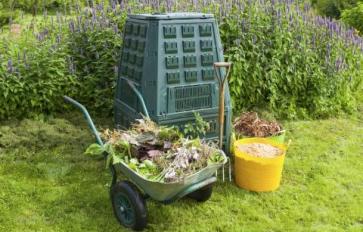
Everyday, we create waste. It's inevitable. We discard – hopefully into the proper receptacle – items that we no longer want, need, or desperately need to get rid of for sanitary purposes. Food wrappers, packaging, and a handful of undesirable items are hauled off into the landfill. This is a luxury we have by living in a first world country. What I find mind blowing is that along with all our trash we get rid of, we also throw away the earth. It wasn't until I saw a trash bin piled high with yard waste that the absurdity of it all hit me. We are guilty of taking the very thing we should be protecting, and tossing it in the landfill.
You may be thinking, “They’re just tree trimmings and grass cuttings, so they can't do any harm piled up in a landfill right?” Not exactly. The dangers of tossing yard waste into the landfill can lead to negative effects one might not consider. As the Sierra Club points out, “it can generate methane gas and acidic leachate and, according to EPA, can seep underground and into nearby buildings where it has the potential to explode.”
Pondering on this concept is absolutely mind-boggling. In order to keep our landscape pristine, we take the yard waste and toss it into a plastic bag. That plastic bag is then hauled off by a vehicle to a landfill where our household waste is taken. It then sits where it can become toxic. Nothing about this concept is eco-friendly, or does any justice to reducing the carbon footprint.
According to The US Composting Council (USCC), “245 million tons of municipal solid wastes were generated in the United States” in 2015, and of that 245 million tons, about two-thirds were organic waste. Some states ban organic waste from filling up the landfill, but others want to lift those very bans due to the idea that the organic waste could be used as an energy source. The USCC argues this poses a threat as it increases the likelihood of the rise of greenhouse gas emissions.
In the current state of affairs, it is more important than ever to decrease our greenhouse gas emissions. Reducing the amount of yard waste that hits the landfills can help. Rather than disposing yard waste, environmentally friendly alternative methods should be utilized. If you are concerned with reducing greenhouse gas emissions and preventing the earth from winding up in landfills, here are a few methods to consider:
- Use yard waste as mulch
- Enrich flower beds with compost
- Recycle for decorative purposes
- Use compost to enrich soil in the vegetable garden
- Use a municipal composting program
- Check with the city or local college to see what programs are offered to utilize yard waste
This is our environment. Together we can protect it and see to it that it doesn't wind up sitting in the landfills.








